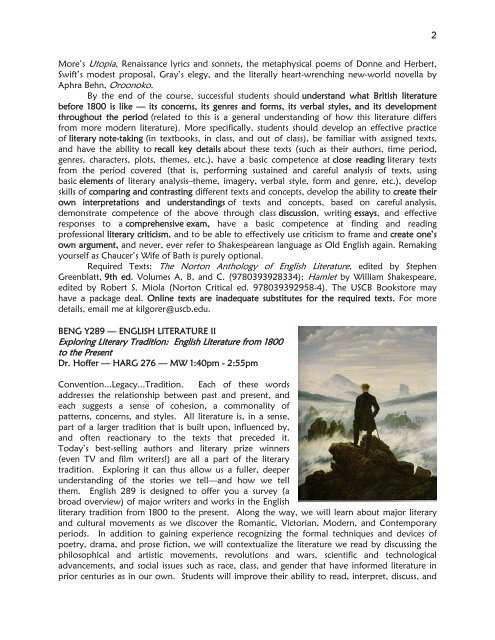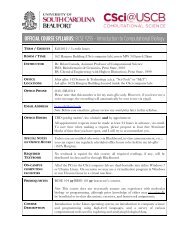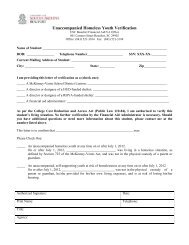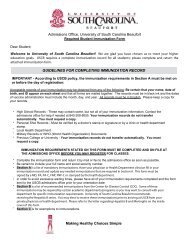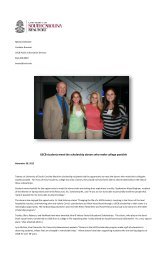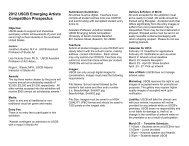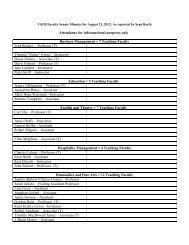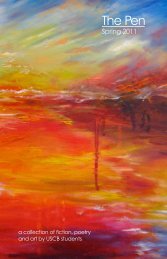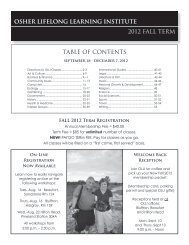SPRING 2013 ENGLISH COURSES
SPRING 2013 ENGLISH COURSES
SPRING 2013 ENGLISH COURSES
You also want an ePaper? Increase the reach of your titles
YUMPU automatically turns print PDFs into web optimized ePapers that Google loves.
More’s Utopia, Renaissance lyrics and sonnets, the metaphysical poems of Donne and Herbert,<br />
Swift’s modest proposal, Gray’s elegy, and the literally heart-wrenching new-world novella by<br />
Aphra Behn, Oroonoko.<br />
By the end of the course, successful students should understand what British literature<br />
before 1800 is like — its concerns, its genres and forms, its verbal styles, and its development<br />
throughout the period (related to this is a general understanding of how this literature differs<br />
from more modern literature). More specifically, students should develop an effective practice<br />
of literary note-taking (in textbooks, in class, and out of class), be familiar with assigned texts,<br />
and have the ability to recall key details about these texts (such as their authors, time period,<br />
genres, characters, plots, themes, etc.), have a basic competence at close reading literary texts<br />
from the period covered (that is, performing sustained and careful analysis of texts, using<br />
basic elements of literary analysis–theme, imagery, verbal style, form and genre, etc.), develop<br />
skills of comparing and contrasting different texts and concepts, develop the ability to create their<br />
own interpretations and understandings of texts and concepts, based on careful analysis,<br />
demonstrate competence of the above through class discussion, writing essays, and effective<br />
responses to a comprehensive exam, have a basic competence at finding and reading<br />
professional literary criticism, and to be able to effectively use criticism to frame and create one’s<br />
own argument, and never, ever refer to Shakespearean language as Old English again. Remaking<br />
yourself as Chaucer’s Wife of Bath is purely optional.<br />
Required Texts: The Norton Anthology of English Literature, edited by Stephen<br />
Greenblatt, 9th ed. Volumes A, B, and C. (9780393928334); Hamlet by William Shakespeare,<br />
edited by Robert S. Miola (Norton Critical ed. 978039392958-4). The USCB Bookstore may<br />
have a package deal. Online texts are inadequate substitutes for the required texts. For more<br />
details, email me at kilgorer@uscb.edu.<br />
BENG Y289 — <strong>ENGLISH</strong> LITERATURE II<br />
Exploring Literary Tradition: English Literature from 1800<br />
to the Present<br />
Dr. Hoffer — HARG 276 — MW 1:40pm - 2:55pm<br />
Convention...Legacy...Tradition. Each of these words<br />
addresses the relationship between past and present, and<br />
each suggests a sense of cohesion, a commonality of<br />
patterns, concerns, and styles. All literature is, in a sense,<br />
part of a larger tradition that is built upon, influenced by,<br />
and often reactionary to the texts that preceded it.<br />
Today’s best-selling authors and literary prize winners<br />
(even TV and film writers!) are all a part of the literary<br />
tradition. Exploring it can thus allow us a fuller, deeper<br />
understanding of the stories we tell—and how we tell<br />
them. English 289 is designed to offer you a survey (a<br />
broad overview) of major writers and works in the English<br />
literary tradition from 1800 to the present. Along the way, we will learn about major literary<br />
and cultural movements as we discover the Romantic, Victorian, Modern, and Contemporary<br />
periods. In addition to gaining experience recognizing the formal techniques and devices of<br />
poetry, drama, and prose fiction, we will contextualize the literature we read by discussing the<br />
philosophical and artistic movements, revolutions and wars, scientific and technological<br />
advancements, and social issues such as race, class, and gender that have informed literature in<br />
prior centuries as in our own. Students will improve their ability to read, interpret, discuss, and<br />
2


